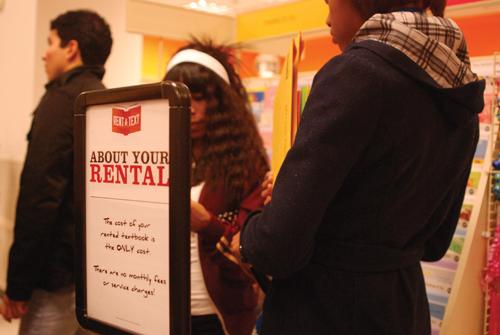In fall 2010, Loyola University offered textbook rental services at the university bookstore for the first time. Rent-A-Text is offered through Loyola’s ongoing partnership with Follett Higher Education Group.
According to statistics posted on the Follett site, in only its first month of availability, Follett has seen the demand for textbook rental surpass its expectations. During this semester, over 1 million textbooks were rented nationwide and student savings across Follett bookstores measure above $45 million. Follett began managing the bookstore in May 2009. Because of this, the store manager was unable to comment on the statistics of book rental here at Loyola. The press representative for Follett was also unavailable for comment.
In an online survey done by Follett, students expressed value in textbook rental and found the process to be simple and the policies to be fair. In fact, the most common feedback from Loyola students and the students surveyed by the company is that there should be more textbooks available for rent.
“I found that I saved some money on the few books I was able rent. But in my case, the ones I wish I could have rented, the most expensive ones, I couldn’t,” said Tyler Litt, biology junior.
In past years, students have turned to other means of acquiring their textbooks. Buying online, borrowing or renting them from friends have been some of those options. Follet’s goal is to add another low-cost option for students in order to make the bookstore a more competitive resource and reinforce the bookstore’s position as the provider of choice for students’ course material needs.
The company’s site states that, while competition has increased because of the alternative options, “only a student’s college store guarantees them the correct textbook and accompanying material that a professor might require.”
In 2010, prior to the launch of the Rent-A-Text program, Robert Reed, assistant vice president for Student Affairs at Loyola, made a statement in a press release which stated, “By providing the Rent-A-Text program, Loyola gives students the opportunity to more effectively make the most of their funds.”
David Reeves, biology junior, is one student who took advantage of that opportunity last semester. However, he says he wouldn’t do it again.
“At the time, I didn’t have the money up front to buy my books, so the program was my only option,” Reeves said.
What seems to be the general consensus among many Loyola students is that the Rent-A-Text program is convenient and great as a last resort if the student does not have the funds to purchase textbooks at the time. But they do not agree that the program saves a lot of money.
“I usually buy the books on Amazon and sell them back at the end of the semester,” Reeves said. “It usually saves more money.”
Some students did not have any problems with the program until the very end when the return policy came into play. The Rent-A-Text return policy states that if you fail to return the rented materials by the rental return due date, or return them in damaged or unsalable condition, you authorize Follett to charge “non-return fees” to your credit or debit card, which include 75 percent of the new book price plus a processing fee of 7.5 percent of new book price. A new book price is based on the new book price at time of rental.
Follett is not responsible for reminding you of the rental return date. One Loyola student, who wishes to remain unnamed, simply forgot to bring her books back on the day of her last final exam and her credit card was charged almost $200 in fees. Although she admits to the policy being fair and takes responsibility for forgetting, she said, “(I’ll never) do it again because it’s not worth it. We’re college students. We forget and we’re busy. And those fees are absolutely ridiculous.”
Kris Johnson can be reached at [email protected]







